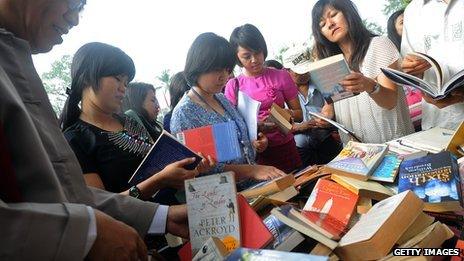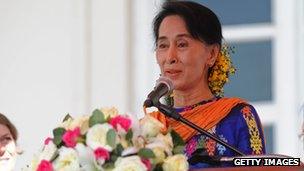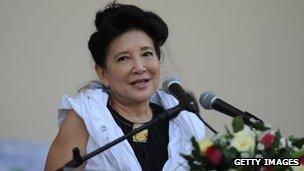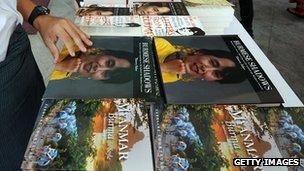Burma holds its first global literary festival
- Published

Visitors were able to browse books on sale outside the hotel hosting the festival
Burma added a touch of poetry to its political reforms at the weekend with the staging of its first international literary festival, made possible after its oppressive censorship regime was lifted last year.
At the three-day lakeside event in Rangoon, red-robed Buddhist monks mingled with former political dissident Aung San Suu Kyi and stars of the international literary scene.
They included British historian and writer William Dalrymple, Indian writer Vikram Seth and Jung Chang, the Chinese-born author of Wild Swans.
Local visitors browsing stalls containing previously banned books spoke of their excitement at the hosting of the Irrawaddy Literary Festival, external, which would not have been possible in Burma even six months ago.
With the official ending of censorship last August, an emerging literary revival seems to be under way in the former British colony, which once counted writers Rudyard Kipling, George Orwell and Chilean poet Pablo Neruda among its residents.

Aung San Suu Kyi said there may be lessons to learn from the festival
During its near-50 years of isolation, Burma had some of the strictest controls on speech of any country in the world.
Writers faced the perpetual threat of imprisonment with words, photographs and even colours liable to be deemed offensive by government censors.
But changes are already evident. Attending the festival was writer Pascal Khoo Thwe who fled his native Burma in 1989, in the wake of a series of deadly protests against the ruling military dictatorship.
Khoo Thwe, from the ethnic Padaung minority, returned to Rangoon for the first time in 23 years to attend Burma's first international literary festival after more than two decades in exile in the UK and Norway.
"Now the fog has lifted… for me it would have been unimaginable o think 20 years ago that we would have this much freedom, to come and celebrate things that were outlawed in the past," he said.
He joined more than 120 Burmese writers and poets holding sessions on topics from oral traditions in Tibet to saving Rangoon's crumbling heritage architecture.

Jung Chang said she wished China had the same freedoms that Burma is starting to enjoy
Jung Chang, whose book Wild Swans was a global best-seller, added: "The happening of this literature festival suggests that writers are going to have more freedom to write and are going to be able to express themselves more than before.
"Myanmar seems to be going towards that goal of people feeling free to write and to publish and I think that is a wonderful thing and I wish the same process in China, where my books are banned."
Publishers too are scrambling to take advantage of Burma's newfound appetite for books, importing previously barred works such as biographies of leaders such as Nelson Mandela, the Dalai Lama and the writings of Aung San Suu Kyi, the Nobel laureate and pro-democracy leader, to meet resurgent public demand.
The literary renaissance has also created a shortage of professional translators, with the waiting list for a work to be translated into Burmese now at least six months, according to one local publisher.
"This is an incredibly literary culture," said Thant Myint-U, the author of two acclaimed English-language books on Burma, The River of Lost Footsteps and Where China Meets India.
"People read a lot, I don't know if it's because there is not much electricity and they don't have TV, but I think it's always been the case, it has survived for whatever reason."

Books were always heavily censored in Burma
Jane Heyn, the festival organiser and wife of the British ambassador to Burma, said she first had the idea for the event two years ago, but her plans lay dormant for more than a year, as until recently it would have been impossible for foreign writers to be granted visas to attend.
"The overriding reason for having the festival was to give Burmese people a chance to read modern literature," she said.
"In many ways that was the inspiration, seeing how difficult it was to find new, modern, affordable literature. Everything was scored through with the censor's pen, it was impossible," she said.
Yet despite an effort by organisers to keep ticket prices low, some attendees said they thought the 1500 kyat (£1.11) entry fee was still too expensive for many ordinary Burmese, in a country where the average wage is a little over a dollar a day.
Others felt the venue, a four-star hotel on Rangoon's Inya Lake, had deterred some people from coming, with a local book festival taking place at the same time in the city centre drawing more than 4,000 participants a day.
Hundreds of visitors
"It should have been held downtown and made free so that ordinary Burmese people could go," said Dr Michael Lim of the Myanmar Publishers and Booksellers Association.
"I think this hotel is too intimidating for many people to attend."
Undeterred, however, were the hundreds of Burmese who had travelled from as far away as Mandalay in the north of the country to catch a glimpse of Ms Suu Kyi, now the political opposition leader, who spent 15 years under house arrest in Rangoon.
She told a packed hall: "It is the first literary festival of this kind that we have ever held, so we have to learn from this. There may be lessons to be learnt from it, things that we want to change for the future.
"But we have to start somewhere, and I think this kind of festival that gets in people from all over the world is very good for our society, which is just beginning to open up."
"I hope that one day our nation will be a nation worth writing poetry about," she added.
- Published2 February 2013
- Published4 February 2013
- Published22 January 2013
- Published29 January 2013
- Published28 December 2012